Why Are Students Not Learning? 0
By Thomas H. Benton
Lack of student preparation. Increasingly, undergraduates are not prepared adequately in any academic area but often arrive with strong convictions about their abilities. So college professors routinely encounter students who have never written anything more than short answers on exams, who do not read much at all, who lack foundational skills in math and science, yet are completely convinced of their abilities and resist any criticism of their work, to the point of tears and tantrums: “But I earned nothing but A’s in high school,” and “Your demands are unreasonable.” Such a combination makes some students nearly unteachable.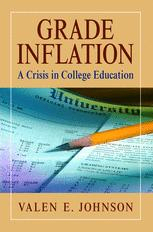
Grade inflation. It has become difficult to give students honest feedback. The slightest criticisms have to be cushioned by a warm blanket of praise and encouragement to avoid provoking oppositional defiance or complete breakdowns. As a result, student progress is slowed, sharply. Rubric-driven approaches give the appearance of objectivity but make grading seem like a matter of checklists, which, if completed, must ensure an A. Increasingly, time-pressured college teachers ask themselves, “What grade will ensure no complaint from the student, or worse, a quasi-legal battle over whether the instructions for an assignment were clear enough?” So, the number of A-range grades keeps going up, and the motivation for students to excel keeps going down.
Student retention. As the college-age population declines, many tuition-driven institutions struggle to find enough paying customers to balance their budgets. That makes it necessary to recruit even more unprepared students, who then must be retained, shifting the burden for academic success away from the student and on to the teacher. Faculty members can work with an individual student, if they have time, but the capabilities of the student population as a whole define the average level of rigor that is sustainable in the classroom. At some institutions, graduation rates are so high because the academic expectations are so low. Failing a lot of students is a serious risk, financially, for the college and the professor.
Student evaluations of teachers. Although a lot of emphasis is placed on research on the tenure track, most faculty members are not on that track and are retained on the basis of what students think of them. The common wisdom, for the untenured, at least whether it is true or not is to find ways to keep the students happy: Expect little, smile a lot, gesture freely, show movies, praise them constantly, give high marks, bring cookies on evaluation day. Wise administrators may read confidential evaluations in context, but students can now use the Internet to retaliate against professors in ways that can damage their ability to sustain minimal enrollments in their classes.
 Enrollment minimums. Students gravitate to lenient professors and to courses that are reputedly easy, particularly in general education. Some students may rise to a challenge; many won’t. They’ll drop, withdraw, or even leave a college that they find too difficult. If you are untenured and your courses do not attract enough students, then you can become low-hanging fruit for nonrenewal. If you are tenured, then it means being “demoted” to teach service courses. In such contexts, the curriculum populated by electives and required courses competing for the lowest expectations is driven increasingly by student demand rather than by what a community of scholars believes undergraduates should know.
Enrollment minimums. Students gravitate to lenient professors and to courses that are reputedly easy, particularly in general education. Some students may rise to a challenge; many won’t. They’ll drop, withdraw, or even leave a college that they find too difficult. If you are untenured and your courses do not attract enough students, then you can become low-hanging fruit for nonrenewal. If you are tenured, then it means being “demoted” to teach service courses. In such contexts, the curriculum populated by electives and required courses competing for the lowest expectations is driven increasingly by student demand rather than by what a community of scholars believes undergraduates should know.
Lack of uniform expectations. It is impossible to maintain high expectations for long unless everyone holds the line in all comparable courses and we face strong incentives not to do that. A course in which the professor assigns a 20-page paper and 200 pages of reading every week cannot compete with one that fills the same requirement with half of those assignments. Faculty members cannot raise expectations by themselves, nor can departments, since they, too, are competing with one another for enrollments.
Understanding College Websites 0
 It was inevitable. Computer technology is here to stay. I remember in 1994, when one of my students said Mr. Goodhart, you should get on the Internet, there is a lot of great information about colleges on it. This revelation may come as a surprise to our current crop of students who were born after 1999. They never had the pleasure of working a slide rule in their advanced math classes.
It was inevitable. Computer technology is here to stay. I remember in 1994, when one of my students said Mr. Goodhart, you should get on the Internet, there is a lot of great information about colleges on it. This revelation may come as a surprise to our current crop of students who were born after 1999. They never had the pleasure of working a slide rule in their advanced math classes.
But after a few years I saw a need to help students understand college websites. They were spending an inordinate amount of time on the site, but coming away with little substantive knowledge about the college. Therefore, I designed an efficient AAA method to do one’s due diligence. When done properly the student should know the important aspects of each college’s particular offerings and ethos. I like to hear students say that it was almost a dejvu experience once they arrived at the college for the first time.
As we head into spring it is a great time for juniors to visit a few colleges while classes are still in session. That is, after applying the AAA method. I will never forget one college admissions officer describe her experience. She drove her daughter 357 miles to tour Lehigh University. The young scholar would not even get out of the car Why not? asked the seasoned admissions officer (aka mom). I am not going to a college where I have to hike up a mountain every day!
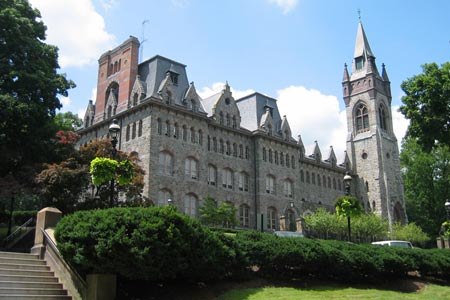 No exaggeration. Now you know. Even college admissions officers have kids. Plus, they too can be tripped up occasionally by poor planning. The AAA method will provide the answers (even to questions not asked) ahead of time and smooth your journey. Go ahead and download it to your desktop now.
No exaggeration. Now you know. Even college admissions officers have kids. Plus, they too can be tripped up occasionally by poor planning. The AAA method will provide the answers (even to questions not asked) ahead of time and smooth your journey. Go ahead and download it to your desktop now.
College Aspirations? 0
 Are you a high school student with college aspirations? This is for you. Grades have been shown to be the single most important predictor of academic success in college. The College Board SAT and ACT Standardized tests are not to be ignored but the more As and Bs you have in your record the more positive attention admissions committees (adcoms) will pay to your application. If you are a junior, you can rectify some academic slumps in the freshman and sophomore years by finishing strong this year.
Are you a high school student with college aspirations? This is for you. Grades have been shown to be the single most important predictor of academic success in college. The College Board SAT and ACT Standardized tests are not to be ignored but the more As and Bs you have in your record the more positive attention admissions committees (adcoms) will pay to your application. If you are a junior, you can rectify some academic slumps in the freshman and sophomore years by finishing strong this year.
But if you are looking at very competitive colleges and not taking the most challenging courses offered at your high school, it may be much harder. A few aberrant Cs will not automatically exclude you from consideration, but you may have to explain the reasons behind the lower grades. Many college application supplements, in fact, ask students to explain any performance that is inconsistent with the larger academic record. It is not uncommon for a strong student to experience a downturn in grades due to an illness, injury, family or school relocation and so on. (I did not like the teacher is not a good reason.)
Having said that, however, colleges know that sometimes a particular subject is unfathomable, or that a disconnect with the instructor’s style of teaching makes it difficult to learn the material. Being honest and forthcoming in taking responsibility for such inconsistency will only earn you the respect of the admissions folks.
Some applicants with mixed grades will still be accepted to selective colleges because of their considerable talent in other areas. I refer here not only to athletes, but also to musicians, actors, dancers or student leaders. Their record may likely show that they have dedicated hundreds of hours to their passion. This is seen as a demonstration of their drive and discipline that will be applied to their academic studies in colleges.
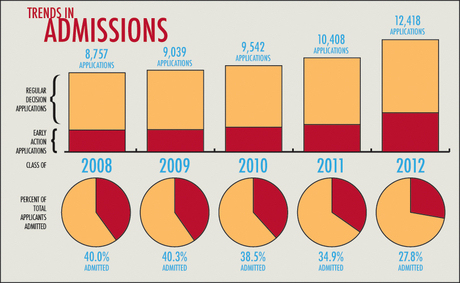 I have been saying since 1999 that each subsequent year will be the largest and most competitive college bound class in United States history. This escalation will peak in 2012. This year and next, therefore, fewer allowances will be made for candidates with unimpressive academic performances and fewer are admitted. Of course, everyone knows about the perennially low admit percentages of the Ivy League and schools of that ilk.
I have been saying since 1999 that each subsequent year will be the largest and most competitive college bound class in United States history. This escalation will peak in 2012. This year and next, therefore, fewer allowances will be made for candidates with unimpressive academic performances and fewer are admitted. Of course, everyone knows about the perennially low admit percentages of the Ivy League and schools of that ilk.
But the good news is that if college is your future, there are many very good options. Those options do not have to be confined to your local state college or university. Those should be looked at closely but with states having trouble meeting their budgets; educational funding is decreasing while enrollment has increased. That translates into extending the years in college to five or more. If you are just getting started ask us for a complimentary get acquainted consultation to explore those options.
The Personal Interview 0
 Snow has now replaced the beautiful fall foliage that colored campuses here in New England. The thousands of newly minted freshman college students have adjusted to college life after saying good bye to parents. Most are already on holiday break and back home. Meanwhile, high school seniors are finishing their college essays and submitting college applications. Many of them have had personal college interviews. For many students there is nothing more nerve-racking than the college interview. But it need not be, with proper preparation.
Snow has now replaced the beautiful fall foliage that colored campuses here in New England. The thousands of newly minted freshman college students have adjusted to college life after saying good bye to parents. Most are already on holiday break and back home. Meanwhile, high school seniors are finishing their college essays and submitting college applications. Many of them have had personal college interviews. For many students there is nothing more nerve-racking than the college interview. But it need not be, with proper preparation.
The personal interview is rarely a required part of the admission process, and is seldom a deciding factor in accepting or rejecting a candidate. In fact, the interview most often serves to confirm other information about a candidate. Similarly, an interview does not transform an unacceptable applicant into an acceptable one.
Colleges also realize that they need to prepare their interviewers as well. An interview may be given by an admissions counselor or an alumni volunteer. Some students and counselors, however, prefer alumni interviews to those conducted by admissions-staff members. Alumni can share their personal stories about a college, and if they are relatively young, their experiences will not be too far removed from what the student might find on the campus.
Alumni, who are not college employees, can come off as being more genuine, too as explained here in a recent article in the Chronicle of Higher Education.
An interview can be an excellent way to learn about a college. It is a two-way exchange. If you are a prospective applicant you should be ready to ask questions that will help you learn more about the college. Be sure to read all the FAQ postings on the website first and be ready to answer questions that will help the interviewer learn more about you.
Do not hesitate to identify one or two things about yourself you want the interviewer to know as the result of talking with you, and be sure to mention them when the interviewer asks, “Is there anything else our (admission) committee should know about you?”
In addition, do not hesitate to share the leadership of the interview. You are not on the witness stand; it is seldom a grilling. You should use the interview as a chance to see if the college fits you, too. Moreover, colleges will want to make both your campus visit and your interview a positive experience for you.
Students using the AAA method will learn quickly as to what the colleges’ interview policies are. Franklin College, for instance, not only recommends them but also makes off campus interviews available in Asia, United States, Europe, the Middle East and Latin America. That may tell you what kind of campus demographic they have.
 Also, many selective colleges will grant local interviews with alums; these are helpful, and alumni can be valuable sources of information about a college. Remember, however, that alums are likely to be volunteers, not employee of the university. As such, their level of current information about the college varies considerably.
Also, many selective colleges will grant local interviews with alums; these are helpful, and alumni can be valuable sources of information about a college. Remember, however, that alums are likely to be volunteers, not employee of the university. As such, their level of current information about the college varies considerably.
If you are a student we are working with on essays and application preparation and one or more of your colleges offer or even require interviews call us to discuss your strategy. A mock interview may be a good idea for you. Give us a call or send an email.
Five MORE Extraordinary Colleges 0
In our March newsletter I wrote about five extraordinary colleges that you never heard of, but should. I am not sure if my putting the spotlight on them increased their application count, probably not, but here are five MORE extraordinary colleges in a periodic series we plan, to expand the vision of the college bound, beyond the usual suspects. I look forward to your thoughts on these and other colleges you may feel need more recognition.
Of course, when all is said and done, does it matter that much where one goes to college? If you are not looking for a specific technical training only offered at a particular college, I say, not necessarily. What really matters is what you do when you get there.
Once in a while I like to step back and look at the colleges that have something to offer that make them stand out. It does not mean they are right for you. But one or more of them could be.
Three of these colleges are definitely not ones that would come up in casual conversation at the dinner table or the country club. Come with me now and enjoy the tour.
 # 1. In the beautiful Pacific Northwest just 35 miles from Seattle sits the University of Puget Sound. Founded in 1888, it is a highly selective liberal arts college with close to 3,000 undergraduates. Because of the Graduate programs in the health sciences and education it is a University. However, the emphasis and Mission Statement is focused on the undergraduate. It offers over 40 majors and 1,200 courses taught by a strong faculty that comes from all over North America.
# 1. In the beautiful Pacific Northwest just 35 miles from Seattle sits the University of Puget Sound. Founded in 1888, it is a highly selective liberal arts college with close to 3,000 undergraduates. Because of the Graduate programs in the health sciences and education it is a University. However, the emphasis and Mission Statement is focused on the undergraduate. It offers over 40 majors and 1,200 courses taught by a strong faculty that comes from all over North America.
Because of its gorgeous location and living conditions, it attracts educators to Puget Sound. For that reason, the University is in the enviable position to be able to hire only the most qualified faculty applicants. The result is a fine Liberal Arts program in addition to rich programs in Asian Languages and Culture, English/creative writing, Communication/Journalism, Music, International Business and the Sciences. They are all impressively strong.
Students describe the academic experience this way. “The professors challenge their students and hold high expectations of them. Writing is stressed across all disciplines at UPS, and students can expect to do a lot of it.” All classes, including labs, are taught by professors and, what I like, all freshman students are assigned a professor from one of their classes to serve as an advisor for their entire first year.
So, if you are a lover of the great outdoors and you want to be challenged academically, Puget Sound is a beautiful place to spend four years many students say.
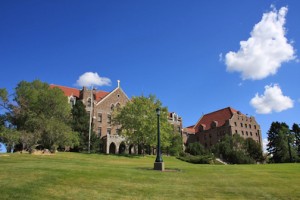 # 2. Now let us travel east across the Rockies to Montana. In the capitol, Helena, you will find one of the most successful (in terms of student outcomes) liberal arts and pre-professional colleges in the west. Founded in 1909 by Catholic Missionaries, Carroll College offers strong programs in the core liberal arts plus eight pre-professional programs, including law, medicine, veterinary science, pharmacy and dentistry.
# 2. Now let us travel east across the Rockies to Montana. In the capitol, Helena, you will find one of the most successful (in terms of student outcomes) liberal arts and pre-professional colleges in the west. Founded in 1909 by Catholic Missionaries, Carroll College offers strong programs in the core liberal arts plus eight pre-professional programs, including law, medicine, veterinary science, pharmacy and dentistry.
Is a city too crowded for you? Do you want solid pragmatic programs in business, accounting or Engineering, among others, at a college that gives you more space to breathe? Well, contact one of Carroll College’s bright and enthusiastic regional counselors here. There is much to see and learn.
This college came to my attention several years ago as one of the hidden gems of higher education by a colleague. Although 40% of students are from outside of Big Sky country, it is not as well known as other gems like Allegheny, Elon, Kenyon and Beloit colleges.
But definitely worth your consideration.
The tour continues here…
Have You Experienced This? 0

This past June we saw many graduation celebrations in the towns surrounding our main office here in the heart of New England. It began about eighteen years ago for the high school seniors and who knows how many years for the college grads. (See Undergraduate Catagory below.) It seems like yesterday that I was in their shoes. Well, maybe the day before yesterday.
The valedictorians and an assortment of college commencement speakers will have shared their words of hope and encouragement to millions of graduates by the end of June across the country. You may have heard one or two of them.
There is one speaker you will not hear at any of these celebratory events this week. But you can here. In fact, I believe anyone can benefit from his enriching words of wisdom. His name is Michael Himes. He was a Professor of Theology at Boston College.
His last lecture prior to retirement at BC was one of the most meaningful, inspirational and compassionate talks I have ever had the pleasure of hearing. I almost think that most traditional commencement speakers could be cancelled and a DVD of his last lecture simply be handed out to all the college graduates. Here is yours. Let me know what you think.
As each spring comes and transitions into summer, I am energized with new life as I see our students conclude one phase of their education and start another. For many teenagers, it may not include college but nonetheless it is a journey toward personal growth and maturity. Hopefully, it will be more than biological maturity but emotional, spiritual and intellectual maturity as well. All of which can come about without the benefit of the college experience.
But if college is the next step, then take full advantage of it. We show students how to evaluate colleges in two important ways. First, how does the freshman class statistical profile fit their profile? By the time the junior year is concluded, a good number of statistical measures can be seen to determine that.
Our students will do their due diligence using the AAA method. That includes seeking out the Common Data Set for each college on their list.
Second, is the college qualified to provide the educational and social experience they are seeking? Do not measure a college by the number of professors with a PhD degree it may have. That does not mean they can teach. For example, look here at a Yale professor introducing his course in finance, Economics 252. By the way, this professor in 2013 won a Nobel prize for Economics. That award is as unmerited as the Nobel Peace prize given to Barrack Obama was. I suggest these are two reasons why our country is such poor shape financially. Graduates are either clueless or have cleverly figured out how to “game” the system.
 If you can, watch his perplexing presentation. What this professor says in the introduction to his course could be said in fifteen minutes. Someone somewhere decided that college, like high school, should be a four-year experience, as a result much of what takes up valuable class time is just inflated fluff. What is taught in four years can be covered more than adequately in three. What do you think?
If you can, watch his perplexing presentation. What this professor says in the introduction to his course could be said in fifteen minutes. Someone somewhere decided that college, like high school, should be a four-year experience, as a result much of what takes up valuable class time is just inflated fluff. What is taught in four years can be covered more than adequately in three. What do you think?
In any case, is the college faculty qualified to teach your child? And, what is it they need to learn? Those are the questions which we can help you answer. Call for a FREE get acquainted conversation. (978) 820-1295 or Zoom.
Do It, but Don’t Over Do It 0
The Dynamics of Demonstrated Interest
By Eric Hoover
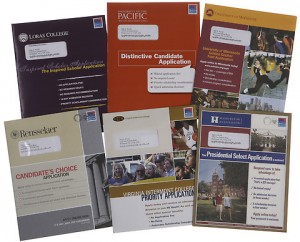 This year, American University received a record 17,000 admissions applications, a 13 percent increase over last year. With quantity came quality: by various statistical measures, the university will admit its most accomplished, most diverse class ever this fall. And American’s admit rate fell to 43 percent from 53 percent this year.
This year, American University received a record 17,000 admissions applications, a 13 percent increase over last year. With quantity came quality: by various statistical measures, the university will admit its most accomplished, most diverse class ever this fall. And American’s admit rate fell to 43 percent from 53 percent this year.
In the numbers-driven realm of admissions, all this is good news, a sign of rising fortunes. But it’s also a complicated development. For one thing, applications have swelled at so many selective colleges that the meaning of such an increase can be difficult for a given admissions office to interpret (increases this year could portend increases next year-or not). Moreover, as colleges become more selective, they often find themselves competing with institutions a rung or two higher on the ladders of selectivity and desirability, at least for the top students.
Although there is prestige in this kind of association, there is also uncertainty. How many applicants would turn down a super-selective, big-name college to attend a somewhat less-selective, less-famous one? How do you know whether a student considers your college a top choice or a “safety school”? How does an applicant’s sense of “fit” with a college relate not only to matriculation, but also retention?
In recent years, such questions have prompted American’s admissions team to look more closely at “demonstrated interest,” the popular term for the contact students make with a college during the application process, such as by visiting the campus, participating in an interview, or e-mailing an admissions representative. In theory, it’s a way to measure the likelihood that an applicant will matriculate-and succeed if they do.
It Is Not Just About Getting In 0
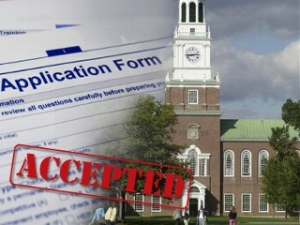 Four short years ago the college bound Class of 2010 completed their high school experience. That was a record year for student applications and competition was keen at the more competitive colleges. The American Enterprise Institute that tracks six-year graduation rates tells us that only 38% of those that went on to college are taking part in commencement ceremonies after four years as an undergraduate.
Four short years ago the college bound Class of 2010 completed their high school experience. That was a record year for student applications and competition was keen at the more competitive colleges. The American Enterprise Institute that tracks six-year graduation rates tells us that only 38% of those that went on to college are taking part in commencement ceremonies after four years as an undergraduate.
And you thought that college was going to be a four-year experience. Yes, it can be that (or less) if you do your due diligence ahead of time.
But here are some reasons why that percentage is so shockingly low.
- ALL four-year colleges are considered. Both public and private from the non-competitive to the most competitive. Often large state universities and less competitive private institutions have weaker or overwhelmed advising staffs.
- Students may fall behind on credits earned in their major.
- They change majors more than twice; credits are not transferable.
- Students drop out for academic or affordability reasons.
- Some classes are over enrolled, limited or cutback and students are not able to take the prerequisite courses in their majors in a timely fashion.
When researching each college using the AAA method a student will be better prepared to avoid most of the above scenarios. This includes understanding the data the colleges are required to report on the Common Data Set. If you do not find the CDS on the college website, ask admissions for it.
 In any case, as the title of this entry states, if the Class of 2010 thought it was competitive getting into college, they are in for a bigger challenge now. Job prospects for new college graduates are at historic lows, partly caused by financial misfeasance and malfeasance on a global scale. If a recent graduate has some internship or cooperative work experience to show on his or her resume, that will help. But with the economy what it is, the challenges still remain.
In any case, as the title of this entry states, if the Class of 2010 thought it was competitive getting into college, they are in for a bigger challenge now. Job prospects for new college graduates are at historic lows, partly caused by financial misfeasance and malfeasance on a global scale. If a recent graduate has some internship or cooperative work experience to show on his or her resume, that will help. But with the economy what it is, the challenges still remain.
 The average student loan debt for graduating seniors in 2008 was $23,186. This year, I dare say the average will be at least $26,000 because the government made additional Stafford loans available to students since 2008. But that does not take into account co-signer or Plus loans that parents may have been taken out during college.
The average student loan debt for graduating seniors in 2008 was $23,186. This year, I dare say the average will be at least $26,000 because the government made additional Stafford loans available to students since 2008. But that does not take into account co-signer or Plus loans that parents may have been taken out during college.
If loans are a burden, parents and students should not hesitate to call us now. We have a sure-fire plan to show you how to become debt free sooner than you think. It makes no sense in starting off with a job that does not afford you the ability to pay basic necessities, provide the comforts and lifestyle you want to have and still meet monthly debt obligations.
In the meantime, graduates, get ready for the toughest job you will have.
Start by reading this timely New York Times article ~ How to market yourself.
Standardized Test Redux 0
March 21, 2010
Colleges Explore Shades of Gray in Making Entrance Tests Optional
Ursinus College considered fairness and ideals as well as marketing and logistics
Sarah Bones for The Chronicle
 Last year Richard DiFeliciantonio (right), vice president for enrollment at Ursinus College, hired a new admissions director, Richard Floyd, whose questions about the role of test scores prompted Ursinus to reconsider its stance.
Last year Richard DiFeliciantonio (right), vice president for enrollment at Ursinus College, hired a new admissions director, Richard Floyd, whose questions about the role of test scores prompted Ursinus to reconsider its stance.
By Eric Hoover
When a college stops requiring standardized admissions tests, no rainbow magically appears. Its endowment doesn’t grow, and its costs don’t shrink. Presidents still worry, professors still complain, and students still drink too much on Saturday nights.
Nonetheless, tales of going “test optional” often have a romantic tinge. In them, admissions deans, worried about equity and anxious teenagers, finally decide to do the right thing by casting off those terrible tests. After that, everything on the campus gets better.
Like many stories, this one invites other interpretations. A popular reading is that competition alone compels colleges to drop their ACT and SAT requirements. In this rendering, colleges care more about their image than anything else.
Fifteen years ago, colleges could still expect to make waves when they adopted test-optional policies. Over the last decade, however, dozens of private liberal-arts colleges have nixed their testing requirements, and these days the announcements cause more of a shrug than a splash.
Nonetheless, the choice remains controversial, often cast as either a noble move or a deceptive one.
In fact, the decision typically melds various motives, arising from a place where marketing and mission overlap. Data often drive a change of heart, but numbers alone don’t always explain whyor when a college alters its testing policy. Often the switch happens gradually, following prolonged discussions, a change in leadership, or some other institutional shift. Like most issues in admissions, the decision is often more complicated than it might seem.
Five Extraordinary Colleges You Know Very Little About…until now 0
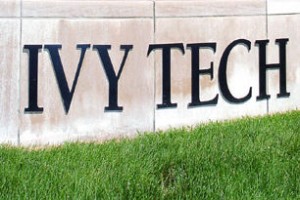 According to the Department of Education, there are 2364 four-year colleges in the United States. Of those, 612 are public colleges. I dare say that about 300 of them would be at least somewhat familiar to about 80% of the public.
According to the Department of Education, there are 2364 four-year colleges in the United States. Of those, 612 are public colleges. I dare say that about 300 of them would be at least somewhat familiar to about 80% of the public.
What about the 2064 unknown colleges. Which of these colleges are worth exploring? When all is said and done, does it matter that much where one goes to college? If you are not looking for a specific program only offered at a particular college, it matters less than you think. What really matters is what you do when you get there.
Some students realize that it might not be a bad idea to look at two-year colleges as well. And some of them are looking at two-year colleges outside of the region in which they live. If there is a community college that is beyond commuting distance but has a specific program you are interested in taking, particularly those with a Phi Theta Kappa Honor Society chapter, you can rent an apartment near the campus. Many colleges such as Greenfield Community College in Massachusetts or the Ivy Tech Community College system in Indiana, can recommend student housing for such students.

Occasionally I like to step back and look at the colleges whose offerings make them stand out. It does not mean they are right for you. But one or more of them could be.
Let me take you on a brief tour of just five of them now.
They are not in any particular order, but # 1 on the list is a two-year college. In fact, this two-year college is tougher to gain admission than is Harvard. Though they are shocked at first, I get a kick out of telling some extremely bright students that they will not have a prayer in being accepted to this college. Here is why.
 1.) Deep Springs College since 1917 accepted only thirteen men into its two-year program each year. That is, until the Class of 2017 applies at which time it may accept female applications. (As of 1/15/17 the decision to accept women has not been made.) It is a rigorous admissions process including several interviews and multiple essays. (The average applicant’s SAT score is 1450.) It is a working cattle and alfalfa ranch but one with a rigorous liberal arts curriculum in the High Desert region of Southern California.
1.) Deep Springs College since 1917 accepted only thirteen men into its two-year program each year. That is, until the Class of 2017 applies at which time it may accept female applications. (As of 1/15/17 the decision to accept women has not been made.) It is a rigorous admissions process including several interviews and multiple essays. (The average applicant’s SAT score is 1450.) It is a working cattle and alfalfa ranch but one with a rigorous liberal arts curriculum in the High Desert region of Southern California.
I have worked with two students in years past who earned their Associate of Arts degree there when it was all-male…until 2018! Yes, young women can now apply to a college where only an AA degree is earned and many applicants, who were also accepted to Ivies, Stanford, and the like, choose to spend two full years in the high desert herding cattle, driving farm tractors, washing dishes and learning how to think critically by means of a very deep academic curriculum from top-flight professors who love to teach there. I have two videos on this page. Be sure to watch this one and the one below.
It was founded by an early California pioneer, LL Nunn in 1917 on his idea that the three pillars… academics, labor, and self-governance help young men prepare themselves for lives of service to humanity. The school’s 26 students, along with its staff and faculty, form a close community. The college operates on the belief that manual labor and political deliberation are integral parts of a comprehensive liberal arts education.
Plus, it is FREE. Each student attends for two years and receives a full scholarship valued at over $50,000 per year. Afterward, most earn their undergraduate and graduate degrees at the world’s most prestigious four-year institutions. It is practically a slam dunk admission transition. Getting a first-class education, and saving up to $110,000 in the process is not a bad way to spend and invest in two years.
Now you know why I can no longer say to some students that they will not have a prayer to being admitted. One intellectually curious young woman I shared this fact with in 1998, was undeterred. Because her goal is to become a college English professor, she saw that as way to be part of the Deep Springs community. (Professors from schools like Stanford, Harvard, and Yale go there to teach periodically for a semester or two.)
Therefore, if you are a male, or female, and intrigued by the concept, why not take 30-minute look at a college like no other.
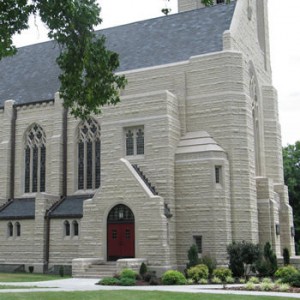 2.) Another college that is respected for its philosophy of combining work with learning is The College of the Ozarks. COFO is committed to a five-fold mission of encouraging academic, Christian, cultural, vocational, and patriotic growth in its students.
2.) Another college that is respected for its philosophy of combining work with learning is The College of the Ozarks. COFO is committed to a five-fold mission of encouraging academic, Christian, cultural, vocational, and patriotic growth in its students.
All full-time students work rather than pay for their tuition. The college discourages debt and, like Hillsdale College, does not participate in any government loan programs. On the other hand COFO does participate in federal grant programs so the FAFSA will need to be filed, to determine eligibility. (Hillsdale does not use the FAFSA.)
Academic offerings are surprisingly broad as you can see here. This combined with the strong work program makes it a valuable experience and excellent preparation for a fulfilling life.
By the way, College of the Ozarks has been named a Stone-Cold Sober School by the Princeton Review for ten consecutive years. Alcohol and drugs are strictly prohibited on and off-campus. Therefore, a student who applies to the school with the nickname Hard Work U. and looks forward to spring breaks in Cancun is unlikely to be a good fit for this college.

